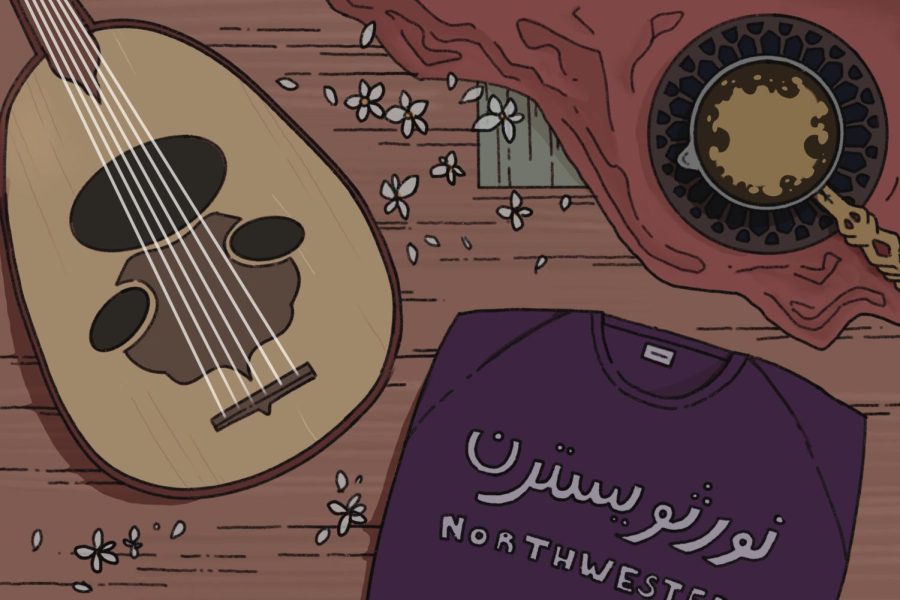MENA students celebrate first University-recognized Arab Heritage Month
Northwestern’s Middle Eastern North African Student Association is celebrating the first University-recognized Arab Heritage Month this year through the arts, food and community.
April 28, 2023
This April, Northwestern Multicultural Student Affairs formally recognized Arab Heritage Month for the first time.
Weinberg junior Sara Ibrahim, the Middle Eastern North African Student Association co-president, said this acknowledgment is a step in the right direction toward increasing MENA visibility on campus. She said this has historically been limited by the lack of a MENA category on the U.S. census.
“One of the big reasons why there was never any programming or community for MENA students is because we don’t have faculty in MSA,” Ibrahim, a former op-ed Daily contributor, said. “That all goes back to being invisible on the census. You can’t create jobs or community for a community that doesn’t exist on paper.”
MSA didn’t organize any programming for Arab Heritage Month this year, which Ibrahim said is because MSA doesn’t have staff members dedicated to supporting MENA students. Instead, the MENA Student Association, which was founded in spring 2021, planned April’s events, some in collaboration with the MENA Studies and MENA Languages programs.
The student group organized an Arabic calligraphy workshop, poetry readings, speaker events and more throughout the month. The second annual Arab Expressions event takes place Friday, featuring spoken Arabic poetry, live music from oud and tabla players, a traditional dabke dance performance and food from Al Bawadi Grill.
Last Spring Quarter, the MENA Student Association introduced Associated Student Government legislation advocating for increased visibility of MENA communities on campus. Programming for Arab Heritage Month was among those demands.
Arab America, a national organization, pioneered the initiative to designate April as National Arab American Heritage Month in 2017. In 2021, the Biden administration recognized NAAHM for the first time.
SESP sophomore Eman Hamed, the incoming co-president of the MENA Student Association, said the process of gaining University recognition for Arab Heritage Month helped members bond.
“The collective endeavor that is getting ourselves seen on campus and establishing our presence brought us way closer than I think going to university with majority-MENA students would have,” Hamed said.
Hamed said MSA Assistant Director Matthew Abtahi provided useful informal advice in navigating University bureaucracy to gain recognition for Arab Heritage Month, though MSA still lacks a staff member dedicated to supporting MENA students.
On Wednesday, Hamed said she met with MSA Associate Director Alejandro Magaña to discuss the creation of that staff position next academic year. MSA told her it plans to include the position in its budget for the upcoming year, but the job still must be approved by the Office of Budget and Planning and other administrative entities, Hamed said.
Arabic Prof. Rana Raddawi said the MENA Studies and MENA Languages programs share the student association’s goal of celebrating MENA cultures.
“There is this beautiful relationship,” Raddawi said. “Whenever there is an event on their side, we support, we attend if we can, and the other way around.”
McCormick senior Omar Khatib, who grew up in Jerusalem, said the MENA Student Association created a space he didn’t realize was missing: one where he could celebrate his heritage with others that shared it.
“(It) made me feel like I have a small community that emulates my life back home,” Khatib said.
MENA Student Association goes all-out in planning events, Hamed said, an attitude that makes large-scale celebrations like Arab Expressions and MENA Beats, a concert highlighting MENA artists and DJs, successful.
But Hamed also said she hopes to establish the MENA Students Association as an “informal space” where students can bond every day.
“The entire purpose of affinity groups is to have your representation on campus, but also to have that community as a safety net to fall back on,” she said.
Email: [email protected]
Twitter: @ava_mandoli
Related Stories:
— Arabic minor to launch in Fall Quarter
— New petition calls on NU to add study abroad programs in MENA region
— MENA Student Association works to increase MENA visibility on campus












